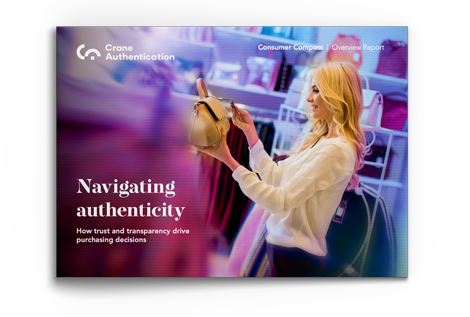How do consumers decide whether authenticity is important? In a world where dupes and counterfeits are just a click away, understanding what drives these choices is essential for brands looking to stay relevant. Of course, we know brand protection alone won’t secure your company’s future if customers aren’t drawn to the genuine article.
To explore these dynamics, we conducted an in-depth survey of over 1,200 consumers across four countries, analyzing their perceptions of authenticity across various industries. By combining quantitative data with qualitative insights, the Consumer Compass uncovers what motivates buyers to value authenticity – or overlook it – in different contexts. The full story is captured in our new report, Navigating Authenticity: How trust and transparency drive purchasing decisions. Here’s a quick look at the key findings.
What authenticity means across industries
The Consumer Compass analyzes attitudes to authenticity across three different sectors: sports apparel and licensed merchandise, designer goods and cosmetics, as well as technology devices and large household appliances. For consumers in some sectors authenticity is critical; for others, it takes a backseat to factors like price, convenience, or style.
For instance, authenticity is often secondary for sports apparel consumers, with only 64% of prioritizing it, and 37% knowingly purchasing dupes. But for nearly all licensed merchandise products, a cherished team jersey for example, consumers see authenticity as vital. Unsurprisingly, designer goods buyers place a premium on authenticity, driven by the high financial and emotional value associated with these products. Meanwhile, cosmetic buyers exhibit a more relaxed attitude. In technology devices and household appliances, thorough research by consumers reflects a focus on safety, reliability, and cost. But brands have an opportunity to bolster trust further through after-sales support, warranties, and repair services.
84%
of licensed merchandise buyers stated authenticity was essential or very important
Brand communication vs. consumer expectations
Overall, consumers value authenticity but struggle to differentiate genuine brands from fakes. Many find it difficult to identify authentic brands, and 83% want brands to provide tools to verify authenticity. The call for better communication around authenticity is clear.
Despite this, only 24% of brands analyzed offer “How-to-Tell Guides,” and just 29% provide authentication tools. What’s more, less than half include brand protection statements on their websites; a missed opportunity to reinforce consumer confidence at the very least.
How can brands build trust through education and messaging about authenticity?
2 in 3
consumers struggle to identify authentic brands
Connecting with distinct personas
Consumers’ approach to authenticity is shaped by their values, habits, and purchasing priorities. Our research identifies three key consumer types: confident, conscientious, and confused, each presenting distinct opportunities and challenges for brands.
Confident consumers prioritize price and convenience over authenticity, more often buying dupes or second-hand items. Conscientious consumers demand sustainability and transparency, conducting thorough research before purchasing. Meanwhile, confused consumers struggle to distinguish genuine products from counterfeits or dupes, which leaves them vulnerable and hesitant.
For diverse consumers, what’s the best way to balance trust and tailored engagement?
57%
of respondents stated they’re willing to pay more for sustainable products
Regional perspectives: a world of contrasts
Consumer perceptions of authenticity vary widely across regions and distinct priorities and behaviors become apparent. For example, in the UK, authenticity is key: 82% of consumers deem it essential or very important, and many take active steps to verify products.
However, other regions tell a different story. In Japan, a comparatively low proportion prioritize authenticity, and far fewer engage with verification tools. In the US, affordability is more likely to trump authenticity, with 15% knowingly purchasing dupes and 11% counterfeits last year.
How can you localize communication and verification strategies so your brand resonates across markets?
63%
of Japanese consumers consider authenticity essential
Age differences: shifting priorities across generations
Generational attitudes toward authenticity, trust, and brand engagement vary significantly. Gen Z value experimentation and affordability the most, with a high proportion revealing they’re open to dupes and counterfeits.
Meanwhile, consumers aged 25-34 are pragmatic and informed: they’re the most likely to conduct pre-purchase research and use digital tools to verify authenticity. However, older generations typically avoid such tools in favor of established brand relationships and traditional purchasing habits.
How does your brand confront the challenge of affordability versus authenticity across generations?
38%
of Gen Z purchased dupes or counterfeits last year

